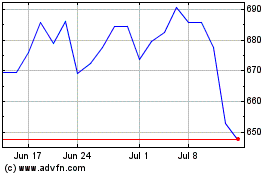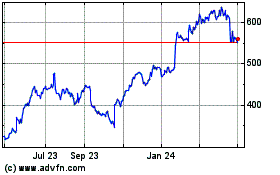EU Proposed Rules Could Force Netflix to Fund European Films -- 3rd Update
May 25 2016 - 10:30AM
Dow Jones News
By Natalia Drozdiak and Sam Schechner
BRUSSELS--The European Union's executive body on Wednesday
proposed legal changes that could force Netflix Inc. and other
online-video providers to help finance European-made films, a first
step by the bloc to update its digital rules to account for rapidly
growing Internet platforms.
In its proposal updating the region's audiovisual media and TV
rules, the European Commission said member states can require
on-demand services established in a different European country to
fork out cash to finance production of its domestic film and TV
content. The financial contributions would only be based on the
revenue generated in the imposing country, the EU said.
"The way we watch TV or videos may have changed, but our values
don't," said EU Digital Commissioner Günther Oettinger. "We also
want to ensure a level-playing field, responsible behavior, trust
and fairness in the online platforms environment."
The proposed changes have a potentially significant financial
impact for companies such as Netflix, whose European headquarters
are in the Netherlands, but which may now have to contribute
between about 15% and 26% of its French revenue to France's
government-enforced system to support film and television
production.
Other EU countries including Italy, Spain and Belgium also have
financing requirements for broadcasters and distributors, but none
are as big as France's.
Netflix has signaled its opposition to such a change. "[T]he
focus of European audiovisual media policy should be on
incentivizing the production of European content and not imposing
quotas," the company wrote as part of a public consultation last
year on the new rules.
"We appreciate the Commission's objective to have European
production flourish, however the proposed measures won't actually
achieve that," a Netflix spokesman said Wednesday.
France, which has been pushing the EU to impose stricter rules
on Web companies, has for several years been pressing for a way to
force firms like Netflix to contribute to its system for promoting
film and TV production, looking to compensate for declining revenue
as viewers migrate away from traditional TV.
When Netflix launched in France in 2014, the government tried to
convince the company to set up a French unit that would be subject
to French cultural taxes. Instead, Netflix has pursued a strategy
of making original programs on its own outside of government
obligations. It just debuted a new political drama named
"Marseille," starring Gerard Depardieu.
The commission's proposal is a long way from being the final
word. Before it is formally adopted, it will likely be amended by
national governments and the European Parliament, a process that
can take many months or even years.
Under the proposed changes, the commission also said web
platforms with a large catalog of videos would also be required to
protect minors from harmful content and protect citizens from
incitement to hatred. It would also require on-demand services to
ensure that at least 20% of their content is European. The share of
European films for both Netflix and Apple's iTunes is already at
21%, according to the EU.
Wednesday's announcement is the first move by the EU to impose
new rules on Internet platforms after it scrapped previous plans to
regulate an array of web companies under one sweeping piece of
legislation.
The move to regulate big Internet platforms in a piecemeal way
is a partial victory for companies, which have lobbied against the
idea of big transversal rules--arguing that such a move could lead
technology firms to curb investment in Europe.
But the strategy also could lead to more fragmentation of rules
across the EU. France, for instance, is currently in the final
phases of deliberating a new "Digital Republic" law that could
create some France-specific regulations for Internet platforms. In
one recent draft, they include a requirement for firms to turn over
information on users to tax authorities.
The EU says it will address any problems arising from disruption
by web platforms in its various proposals, including new copyright
and telecoms rules due in the fall. The commission will decide this
year if any other rules to address platform issues are needed,
beyond those already in the pipeline.
That's how we're going to reach our goal of a level-playing
field--for traditional broadcasters, for telecoms operators on one
side and for new services on the other," said Mr. Oettinger, adding
that he was confident web platforms would still be able to succeed
in the EU despite any new rules.
The commission said it would also investigate issues raised by
businesses, who have accused some platforms of unfair terms and
refusing firms access to essential business data or promoting their
own service to the detriment of the third-party supplier. The EU
will determine by spring of next year whether more action is
needed, it added.
The commission also called on web platforms to abide by existing
rules and to indicate more clearly which search results are
sponsored and to tackle practices such as fake or misleading online
reviews.
Write to Natalia Drozdiak at natalia.drozdiak@wsj.com and Sam
Schechner at sam.schechner@wsj.com
(END) Dow Jones Newswires
May 25, 2016 10:15 ET (14:15 GMT)
Copyright (c) 2016 Dow Jones & Company, Inc.
Netflix (NASDAQ:NFLX)
Historical Stock Chart
From Mar 2024 to Apr 2024

Netflix (NASDAQ:NFLX)
Historical Stock Chart
From Apr 2023 to Apr 2024
